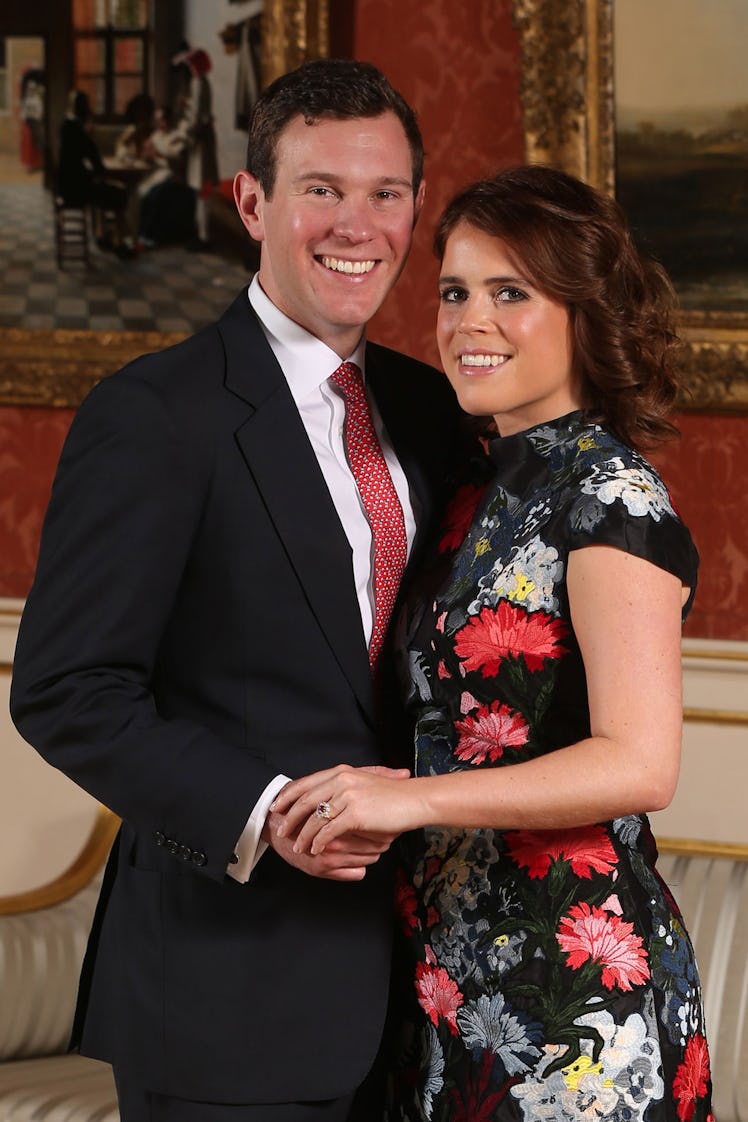
Here's How Jack Brooksbank Is Connected To The Royal Family Despite His "Commoner" Status
Princess Eugenie and Jack Brooksbank are tying the royal knot this weekend on Oct. 12, but is Jack Brooksbank royal already? Does being engaged to a member of the royal family automatically mean you're a royal? It doesn't, but Jack Brooksbank kind of already is a royal even when you don't add Princess Eugenie to the picture. You see, Jack Brooksbank has royal ancestors. His ancestors are related to his fiancé's ancestors, making them distant (and I mean distant) cousins. He still has royal lineage nonetheless, albeit it doesn't mean he's technically an official royal.
Here's how it breaks down: On Princess Eugenie's mother's (Sarah, the Duchess of York's) side, she's related to Thomas William Coke — a 19th century Earl. Coke was married twice — first to Juliana Whitbread, then to Georgina Caroline Cavendish. Eugenie's lineage goes back to Coke's first marriage, and Jack's goes back to his second, making them third cousins once removed. So if you were worried that they were somehow close relatives, don't be. They're basically as related to each other as Kendall Jenner and Gigi Hadid (who also share a bizarre family connection).
It's Princess Eugenie's father's side of the family that is directly related to the current English monarch. Eugenie's father is Prince Andrew, the Duke of York, aka Prince Charles' little brother and Prince William and Prince Harry's uncle. That puts Princess Eugenie ninth in line for the throne. (If/when Harry and Meghan have children, Eugenie will move further down the line of succession.) Once Princess Eugenie and Jack get married on Oct. 12, Jack's royal status will go from basically non-existent to undeniable.
He will be married to a member of the royal family, which will kind of make him a royal, but it's likely that Jack won't be getting an official title like Meghan Markle did the day she married Prince Harry.
This isn't any shade toward Jack from the royal family, it's just tradition. According to royal expert Richard Fitzwilliams in a comment to Express.co.uk, it's unlikely that Jack will be getting a title for a couple of reasons. First, commoners that marry princesses have never received titles, according to royal precedent. It's also unlikely the Queen, who's the only person with the power to make an exception to that rule, would make an exception in this case. Princess Eugenie isn't a "working royal." This means her full-time job doesn't consist of making official royal appearances and working on the family's various philanthropic efforts like the Duke and Duchess of Cambridge and the Duke and Duchess of Sussex do. In fact, the only reason she's called a princess at all is that her father is the one who is the son of the queen. If Sarah Ferguson, the Duchess of York/Prince Andrew's ex-wife, was the one who was related to Queen Elizabeth, her daughters wouldn't have had the titles of Princess because — *grits teeth* — she's a woman.
Yup, as per current royal family practices, royal titles are only passed down from fathers to their children. That's why Prince George, Princess Charlotte, and Prince Louis all have royal titles in front of their names. Typically, only the oldest child of the son of the monarch is given the titles of prince/princess, but Queen Elizabeth allowed for Prince Andrew's daughters to have the titles as well. Prince Edward's children bear the titles of lord/lady (which are the likely titles Harry and Meghan's children will receive). Princess Anne's children don't have any titles at all, but not for lack of trying on the Queen's part. Her Royal Highness actually offered to grant Princess Anne's children royal titles, but Princess Anne famously turned down the offer.
Given that she's not a "working royal," Princess Eugenie has the right to choose whether or not she takes her husband's last name. If she does, her official royal title would be Her Royal Highness Princess Eugenie, Mrs. Brooksbank.
Whatever Eugenie decides to do, Jack's probably not getting a title.